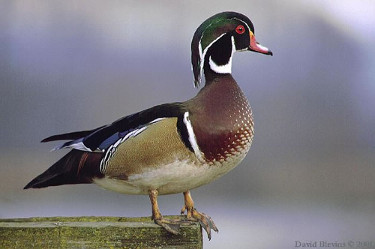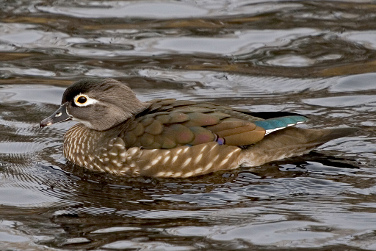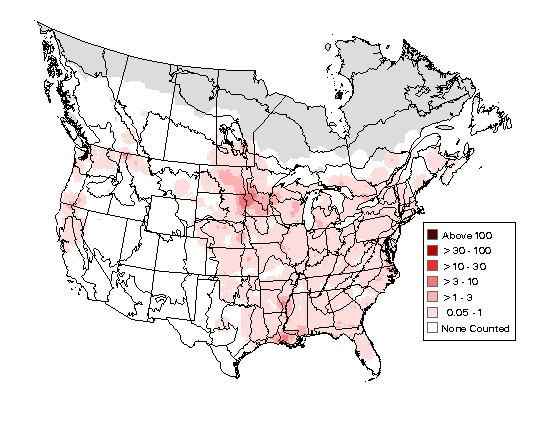Wood Duck

Wood Duck Information
Length: 17 - 20.5"
Habitat: Wooded wetlands, wooded edges of ponds, lakes, streams, and slow-moving rivers.
Diet: Aquatic plants and their seeds, aquatic and terrestrial insects, crustaceans, waste grains, acorns, beechnuts, other nuts and seeds.
Additional Information
Wood DuckDescription, distribution, behavior, habitat, diet, reproduction, and conservation status. Includes photos and range map. (From Wikipedia)
Wood Duck
Photos, description, habitat and habits, range, feeding, breeding and conservation information. (From Hinterland Who's Who)
Female Wood Duck

By Alex Starr via CC
Wood Duck
Identification Tips
- A medium-sized duck with a long crest on head
- Long-winged and long-tailed
- Blue-green speculum with white rear border
- Alternate plumage worn from Fall-through early summer
- Red bill
- Red eye
- Green head
- Striking white stripes about face and crest with a large white throat patch and "fingerlike" extensions onto cheek and neck
- Chestnut breast and neck with vertical white stripe at lower margin
- Golden flanks bordered above by a white flank stripe
- White belly
- Iridescent dark green-blue back and wings
- In basic plumage, the male resembles the female, but often retains the distinctive neck patch and red bill
- Gray bill
- White teardrop shaped patch around eye
- White throat
- Gray-brown head and neck
- Gray-brown breast stippled with white and fading to a white belly
- Dark brown back
(Credit: U. S. Geological Survey)
Breeding Bird Survey Map,
2011-2015

(Image credit: USGS)
Wood Ducks that breed in northern New England tend to move further south in the winter. This bird is found year round in southern New England.
Winter Map from eBird
Sightings of the Wood Duck Nov-Mar over last 10 years
Christmas Bird Count Map
Historical CBC Map from USGS